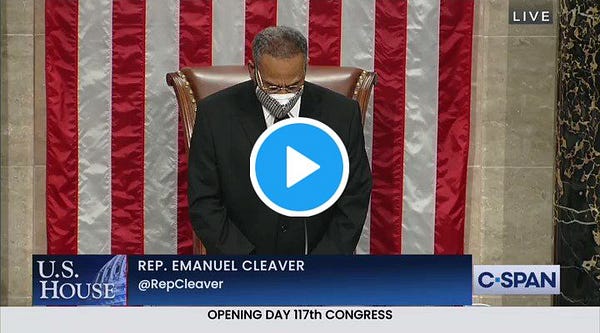Amen, Awoman, Amess: Explaining the Real Meaning of 'Amen' in the Midst of Strangeness
A...woman?
“Amen and Awoman.”
That was the proclamation at the end of an opening prayer for the 117th Congress (delivered by Rep. Emanuel Cleaver) that has now been heard, seen and read around the interwebs.
Some insist the utterance was a “dad joke,” while others have been left totally perplexed and scratching their heads, questioning, as did Abby Johnson: “Are we in that hand basket yet?”
Watch the bizarre moment unfold:
So, no matter what you think about the level of seriousness to this “awoman” additive, there are some essential elements we must note.
Mainly: the meaning of “Amen” has absolutely nothing to do with gender.
You read that correctly. Nothing. Zilch. Zip. Nada.
We traditionally say “Amen” at the end of our prayers to the Lord. But perhaps you’re wondering why. Dictionary.com has more about the meaning of the word:
Amen is commonly used after a prayer, creed, or other formal statement. It is spoken to express solemn ratification or agreement. It means “it is so” or “so it be.” Amen is derived from the Hebrew āmēn, which means “certainty,” “truth,” and “verily.”
In English, the word has two primary pronunciations: ah-men or ay-men. But, it can be expressed in endless ways, from a soft whisper to a joyous shout. Amen is found in both the Old and New Testament.
“Amen” appears early on in the Bible in Numbers 5:22 (NIV), and Christianity.com has more about its origins and roots:
The Hebrew and Greek words for amen appear hundreds of times in the Bible and have several uses. Amen is a transliteration of the Hebrew word amen. The verb form occurs more than one hundred times in the Old Testament and means to take care, to be faithful, reliable or established, or to believe someone or something. The idea of something that is faithful, reliable, or believable seems to lie behind the use of amen as an exclamation on twenty-five solemn occasions in the Old Testament.
So, if the “awoman” mentioned at the end of the prayer wasn’t a “dad joke,” I’m a bit confused as to what was being stated.
Christians do pray in Jesus’ name, which is another important point to be made (and perhaps another conversation). But, either way, what in the world is going on with this prayer? I’m not quite sure. But I figured I’d try to offer a bit of background.
These folks also have some opinions on the matter:












